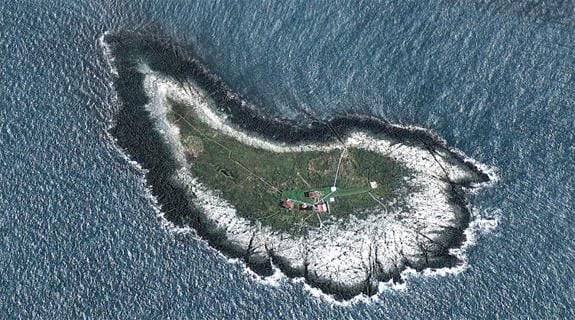Canada And the United States Are Bickering Over Ownership of a Tiny Island
A tiny island with little more than a lighthouse and some puffins is the center of a border disagreement
/https://tf-cmsv2-smithsonianmag-media.s3.amazonaws.com/filer/2012122601102012_26_2012_machias-seal-island-puffin.jpg)
Ten miles off the coast of Maine, Machias Seal Island is one of the last holdouts of the centuries-long process of ironing out the U.S.–Canadian border. A 17th century British land grant underpins the Canadian land claim, arguing the island was a part of the province of Nova Scotia. The establishment of a lighthouse on the island in 1832 by the British serves as the supposed final stake in the Canadian perspective on the debate, says Stephen R. Kelley, the former U.S. ambassador to Canada in an opinion story in The New York Times. From the American perspective, however, the 1783 Treaty of Paris—the document that ended the Revolutionary War between the British and the U.S.—gives the island to America.
Though the island’s home country has never been resolved, the two countries don’t seem to be particularly miffed by the discrepancy. Kelley thinks he knows why: there’s nothing really valuable to drive the contention.
While abundant legal arguments surround Machias Seal Island, natural resources are far less evident. No oil or natural gas has been discovered in the area, nor has it had any strategic significance since it served as a lookout for German U-boats during World War I.

Even the lighthouse’s keeper, says the Canadian Press, isn’t too bothered:
For Ralph Eldridge, a Canadian who has been a lightkeeper on the island for the last 16 years, the question of who owns Machias Seal Island is a “non-issue,” something that is never a question from the visitors who travel to the island each summer.
And Eldridge said he doesn’t have to produce his passport to go there.
“But neither does someone from the United States or China or Japan or Spain have to when they come to the island,” he said.
Kelley, the former ambassador, thinks that now, when nothing is really going on to drive the need to settle the dispute, is exactly the right time to work out the question of the island’s nationality.
Plus, ironing out the ownership of Michias Seal Island, the last piece of actual land disputed by the U.S. and Canada, could be a prelude to settling the much more divisive debates going on over maritime boundary claims in the steadily-melting and gas-rich Arctic Ocean.
More from Smithsonian.com:
170 Years of America’s Evolution In One Animated Gif
Your State Border Might Not Be Where You Think
/https://tf-cmsv2-smithsonianmag-media.s3.amazonaws.com/accounts/headshot/smartnews-colin-schultz-240.jpg)
/https://tf-cmsv2-smithsonianmag-media.s3.amazonaws.com/accounts/headshot/smartnews-colin-schultz-240.jpg)